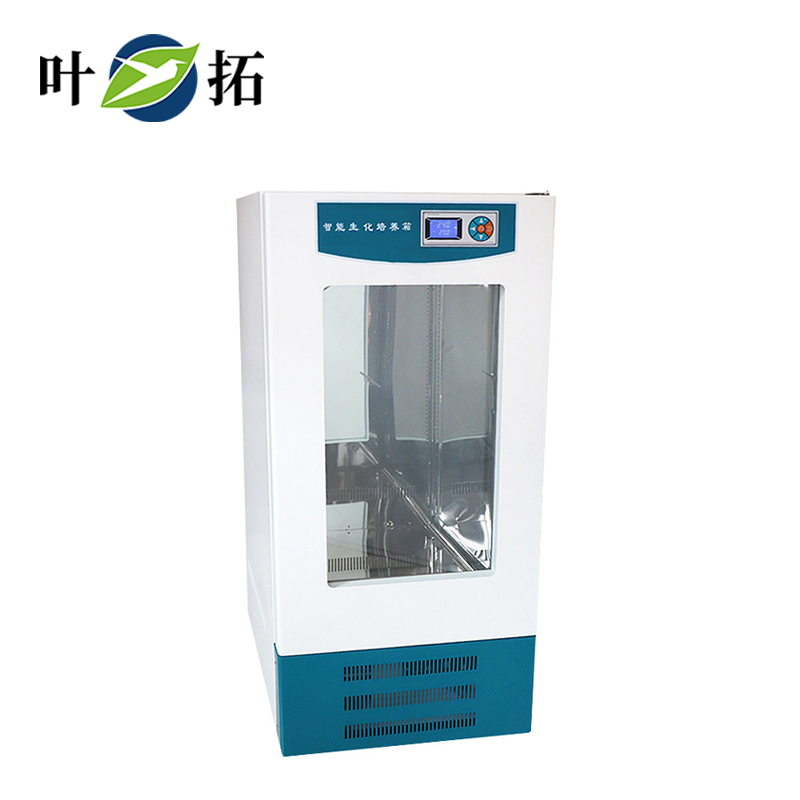Shanghai Yetuo Biological Incubator is a box type device used for cultivating microorganisms, bacteria, molds, and plant/animal cells. Simulate an environment suitable for its growth by controlling conditions such as temperature, humidity, light, carbon dioxide, pH, etc.
A biological incubator is a laboratory equipment widely used in the fields of plants, biology, microbiology, genetics, viruses, medicine, environmental protection, etc. It is widely used in low-temperature and constant temperature experiments, cultivation experiments, environmental experiments, etc.
Shanghai Yetuo Biological Incubator Classification: Biochemical Incubator, Mold Incubator, Constant Temperature and Humidity Incubator, Anaerobic Incubator, Constant Temperature Incubator, Carbon Dioxide Incubator, Light Incubator, etc.
1. Shanghai Yetuo Biochemical Incubator
The biochemical incubator is equipped with both electric heating wire heating and compressor cooling. Therefore, it has a wide adaptability range and can maintain a constant temperature throughout the year, gradually becoming popular. The use and maintenance of this incubator are similar to electric incubators. Due to the installation of a compressor, it is also necessary to follow the precautions for refrigerator maintenance, such as maintaining stable voltage, avoiding excessive tilting, and promptly cleaning the dust on the radiator.
Characteristics: Biochemical incubators generally have dual standard cold and hot temperature control. Generally equipped with a glass observation window, without humidity control or antivirus function.
Biochemical incubator is an indispensable laboratory equipment for plant, biological, microbiological, genetic, viral, medical, environmental and other scientific research and education departments. It is widely used in low-temperature and constant temperature experiments, cultivation experiments, environmental experiments, etc.
2. Shanghai Yetuo Mold Incubator
A mold incubator is an experimental equipment suitable for cultivating eukaryotic microorganisms such as molds. Most molds are suitable for growing at room temperature (25 degrees Celsius) and require a certain humidity to be maintained when cultivated on solid substrates. Therefore, a typical mold incubator consists of a refrigeration system, a heating system, an air humidifier, a cultivation chamber, a control circuit, and an operation panel, and uses temperature and humidity sensors to maintain stable temperature and humidity inside the cultivation chamber. Some special mold incubators can also set temperature and humidity to vary with cultivation time.
Features: Dual standard cold and hot control, heatable, refrigerable, humidity control
This product is suitable for scientific research, university experiments, and production departments such as environmental protection, health and epidemic prevention, agriculture and animal husbandry, drug testing, and aquaculture. It is water analysis; BOD determination of bacteria and fungi; Cultivation and preservation of microorganisms; Specialized constant temperature and constant temperature oscillation equipment for plant cultivation and breeding experiments.
3. Shanghai Yetuo Constant Temperature and Humidity Incubator
A constant temperature and humidity incubator is a type of box that can accurately simulate complex natural environments such as constant temperature and humidity, and has a precise temperature and humidity control system.
Features: Temperature control, humidity control, generally without observation window.
Laboratories are generally used for plant cultivation and breeding experiments; Bacterial and microbial cultivation, used for breeding, fermentation, microbial cultivation, various constant temperature tests, environmental tests, substance denaturation tests, and storage of culture media, serum, drugs, and other items. It can be widely applied to sterile testing in pharmaceuticals, textiles, food processing, and other fields. It is also widely used in research and application areas such as healthcare, biopharmaceuticals, agricultural research, and environmental protection.
Industry is generally used for high and low temperature, high and low humidity experiments on electronic and electrical equipment, household appliances, automobiles, instruments and meters, electronic chemicals, components, raw materials, coatings, and plating layers. It is highly favored in fields such as aerospace, aviation, ships, weapons, electronics, petrochemicals, postal and telecommunications, communications, and automobiles.
4. Shanghai Yetuo Anaerobic Incubator
Anaerobic glove box, also known as anaerobic incubator, is one of the internationally recognized excellent instruments for cultivating anaerobic bacteria. It is a closed large metal box with a transparent panel made of organic glass in front of it. The panel is equipped with two gloves, which can be used to operate inside the box, hence the name.
Anaerobic incubator is a specialized device for bacterial cultivation and operation under anaerobic environmental conditions. It can provide strict anaerobic conditions with constant temperature cultivation and has a systematic and scientific working area.
Features: Anaerobic control, temperature control
This product is a specialized device that can be used for bacterial cultivation and operation in anaerobic environments. It can cultivate the most difficult to grow anaerobic organisms while avoiding the risk of death from exposure to oxygen when operating anaerobic organisms in the atmosphere. Therefore, this device is an ideal tool for anaerobic biological detection research.
5. Shanghai Yetuo Constant Temperature Incubator
A constant temperature incubator is suitable for both regular bacterial culture and closed cell culture, and is commonly used for preheating equipment and reagents related to cell culture.
Features: Heating control, without cooling.
Constant temperature incubators are divided into: water-resistant constant temperature incubators and electric constant temperature incubators.
Waterproof electric constant temperature incubator:
The heating tube heats the water inside the interlayer, utilizing the convection of water to form four sided heating, effectively ensuring heating uniformity. Temperature control range: Room temperature+5 ℃ -60 ℃, can only stabilize the temperature above room temperature, without refrigeration.
When the water jacket encounters a power outage, it can still maintain a good temperature, using two temperature control methods: microcomputer intelligent temperature controller and bimetallic regulator.
6. Shanghai Yetuo Carbon Dioxide Incubator
A carbon dioxide incubator is a device that simulates a growth environment similar to that of cells/tissues in living organisms. The incubator requires stable temperature (37 ℃), stable CO2 level (5%), constant pH (7.2-7.4), and high relative saturation humidity (95%) to culture cells/tissues in vitro.
Users around the world have two basic requirements for carbon dioxide incubators. Firstly, they require the incubator to provide the most accurate and stable control over temperature, carbon dioxide concentration, and humidity, in order to facilitate the progress of their research work; The second requirement is that the carbon dioxide incubator can effectively prevent microbial contamination inside the incubator and regularly eliminate contamination to protect research results and prevent sample loss. So, the teacher who chooses a carbon dioxide incubator is most concerned about its high reliability, pollution prevention and control, and ease of use.
Features: Temperature control, generally only with heating, can be sterilized at high temperatures, some have refrigeration, CO2 level control, pH control, humidity control
Carbon dioxide incubators are widely used in cell and tissue culture, as well as the cultivation of certain special microorganisms. They are commonly used in cell dynamics research, collection of mammalian cell secretions, carcinogenic or toxic effects of various physical and chemical factors, antigen research and production, cultivation of hybridoma cells to produce antibodies, in vitro fertilization (IVF), stem cells, tissue engineering, drug screening, and other research fields.
The carbon dioxide incubator is a new type of incubator that cannot be replaced by ordinary electric constant temperature incubators. Due to the increase in carbon dioxide concentration control and the use of microcontrollers for precise temperature control of the incubator, the success rate and efficiency of culturing biological cells, tissues, etc. have been improved.
7. Shanghai Yetuo Light Incubator
A light incubator is a high-precision constant temperature equipment with light function, which is a specialized constant temperature cultivation device for the cultivation and breeding experiments of bacteria, molds, and microorganisms. It is particularly suitable for scientific research and production in fields such as biotechnology, medical research, agricultural and forestry science, aquaculture, and animal husbandry.
Features: Light control, constant temperature control (cooling and heating)
Light incubators are mainly used for plant cultivation, while microbial incubators have different types depending on the type of microorganisms being cultured.


 Alibaba Store
Alibaba Store Tmall Store
Tmall Store Jingdong Sstore
Jingdong Sstore







